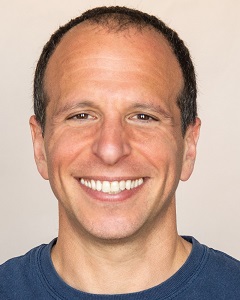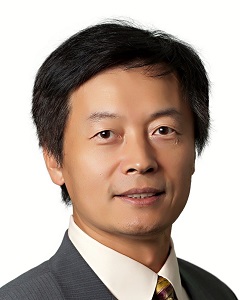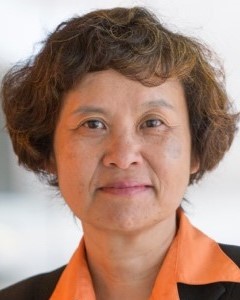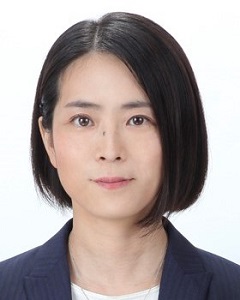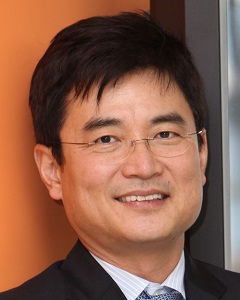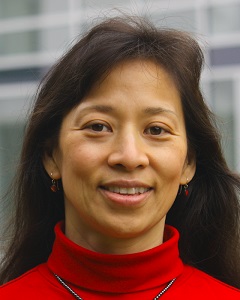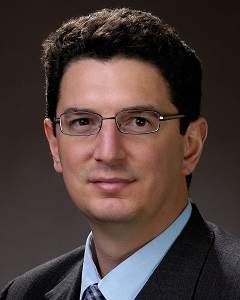Plenary and Semi-Plenary Speakers
We are excited to announce the following renowned speakers for the daily Plenary and Semi-Plenary sessions.
Reminder: All times are Berlin time (CEST, UTC+2h)!
Benjamin Recht
UC Berkeley, USA
Reflections on the Learning-to-Control Renaissance
Monday, July 13, 13.30-15.00
S. Joe Qin
City University of Hong Kong, China
Integrated Framework of Systems, Data, and Industrial Intelligence towards Industry 4.0
Tuesday, July 14, 14.30-16.00
Dana Kulić
Monash University, Australia
Estimating human objectives from action and interaction
Tuesday, July 14, 14.30-16.00
Jing Sun
University of Michigan, USA
The Joy of Exploring the Emerging Dynamics of Integrated Systems
Wednesday, July 15, 13.00-14.30
Mihoko Niitsuma
Chuo University, Japan
Toward Human Assistive Robotics for Aiding Human Activity
Wednesday, July 15, 14.30-16.00
Maarten Steinbuch
Eindhoven University of Technology, Netherlands
Pushing the limits of performance
Wednesday, July 15, 14.30-16.00
Jay H. Lee
KAIST, Republic of Korea
Reinforcement Learning for Process Control and Beyond
Thursday, July 16, 13.00-14.30
Lucy Pao
University of Colorado Boulder, USA
Going Big: Control Co-Design for Extreme-Scale Wind Turbines
Thursday, July 16, 14.30-16.00
George J. Pappas
University of Pennsylvania, USA
Safe autonomy with deep learning in the feedback loop
Thursday, July 16, 14.30-16.00
Alin Albu-Schäffer
DLR and TU Munich, Germany
Robots Interacting with Humans and Unknown Worlds: Pushing the Boundaries of Nonlinear Control
Friday, July 17, 13.30-15.00
Benjamin Recht (UC Berkeley, USA)
Reflections on the Learning-to-Control Renaissance
Monday, July 13, 13.30-15.00
Abstract: I will reflect on the past decade's progress in combining machine learning and control theory to build safe, agile, and autonomous systems. Highlighting work done inside and outside of my research group, in both academia and industry, I will discuss successful theory and practice that has helped us understand the potential impact and fundamental limits of learning enabled control systems. I'll not only describe new results but also older lessons established decades ago---though forgotten in the current excitement about artificial intelligence. I will also detail the formation of several new cross-disciplinary communities and the potential opportunities that can be gained by investing in and expanding upon these new collaborations. I'll close by presenting some of the exciting challenges that engineers must solve before we can reliably build robust, safe learning systems that interact with an uncertain physical environment.
Bio: Benjamin Recht is an Associate Professor in the Department of Electrical Engineering and Computer Sciences at the University of California, Berkeley. Ben's research group studies how to make machine learning systems more robust to interactions with a dynamic and uncertain world. Ben is the recipient of a Presidential Early Career Award for Scientists and Engineers, an Alfred P. Sloan Research Fellowship, the 2012 SIAM/MOS Lagrange Prize in Continuous Optimization, the 2014 Jamon Prize, the 2015 William O. Baker Award for Initiatives in Research, and the 2017 NIPS Test of Time Award.
S. Joe Qin (City University of Hong Kong, China)
Integrated Framework of Systems, Data, and Industrial
Intelligence towards Industry 4.0
Tuesday, July 14, 14.30-16.00
Abstract: With the development of internet of things, smart and unconventional sensors, wireless communications, mobile devices, and edge and cloud computing, data driven machine learning is at the doorsteps of disrupting many industries and transforming them to smart manufacturing or Industry 4.0. In this talk, we propose a paradigm shift from traditional signals-based systems theory, which is a core foundation for most industrial systems, to an integrated framework of multi-source data and system models, where system models reveal expected behavior and data reveals unexpected and emerging behavior. The ultimate tools to transform data into emerging situational knowledge are machine learning or data analytics. The data-driven industrial intelligence can lead to autonomous systems in one way, and automated knowledge extraction in another way to assist human decisions. In the latter case, the industrial intelligence must be i) predictive, ii) interpretable, and iii) working with known first principles. Therefore, dynamic data analytics that are compatible to systems theory are necessary to model industrial control and operation data. Such analytics are complementing to first principles to perform feature engineering, quality and performance predictions, fault diagnosis, troubleshooting, and intelligent decision making. It is argued that human beings are at the center of the industrial intelligence system, who are assisted by the automated knowledge extraction and visualization tools for smart operations and decision-making.
Bio: Dr. S. Joe Qin obtained his B.S. and M.S. degrees in Automatic Control from Tsinghua University in Beijing, China, in 1984 and 1987, respectively, and his Ph.D. degree in Chemical Engineering from University of Maryland at College Park in 1992. He is currently Chair Professor, Dean of the School of Data Science, and Director of Hong Kong Institute for Data Science at City University of Hong Kong. In his prior professional career he worked as the Fluor Professor at the Viterbi School of Engineering of the University of Southern California, Professor at the University of Texas at Austin, and Principal Engineer at Emerson Process Management for a cumulated 28 years.
Dr. Qin is a Fellow of AIChE, IEEE, and the International Federation of Automatic Control (IFAC). He is a recipient of the U.S. National Science Foundation CAREER Award, the 2011 Northrop Grumman Best Teaching award at Viterbi School of Engineering, the DuPont Young Professor Award, Halliburton/Brown & Root Young Faculty Excellence Award, NSF-China Outstanding Young Investigator Award, and recipient of the IFAC Best Paper Prize for a model predictive control survey paper published in Control Engineering Practice. He has served as Senior Editor of Journal of Process Control, Editor of Control Engineering Practice, a Member of the Editorial Board for Journal of Chemometrics, and Associate Editor for several journals. He has published over 400 international journal papers, book chapters conference papers and presentations. He received over 14,000 Web of Science citations with an h-index of 57, over 18,000 Scopus citations with an h-index of 61, and 30,000 Google Scholar citations with an h-index of 74. Dr. Qin’s research interests include data analytics, machine learning, process monitoring and fault diagnosis, model predictive control, system identification, semiconductor manufacturing, building energy optimization, and predictive maintenance.
Dana Kulić (Monash University, Australia)
Estimating human objectives from action and
interaction
Tuesday, July 14, 14.30-16.00
Abstract: Estimation of human control objectives is an important topic in biomechanics, human-robot interaction and rehabilitation engineering. In this talk, I will describe our recent work considering the estimation of human control objectives from two perspectives: First, how control objectives can be estimated by observing human action, including time-varying objectives and and from incomplete observations. Second, how human preferences for robot behaviour can be estimated, through different interaction strategies including preference elicitation and corrections. These techniques allow non-expert users to more easily and naturally specify desired robot behaviour.
Bio: Prof. Dana Kulić conducts research in robotics and human-robot interaction (HRI), and develops autonomous systems that can operate in concert with humans, using natural and intuitive interaction strategies while learning from user feedback to improve and individualize operation over long-term use. Dana received the combined B. A. Sc. and M. Eng. degree in electro-mechanical engineering, and the Ph. D. degree in mechanical engineering from the University of British Columbia, Canada, in 1998 and 2005, respectively. From 2006 to 2009, she was a JSPS Post-doctoral Fellow and a Project Assistant Professor at the Nakamura-Yamane Laboratory at the University of Tokyo, Japan. In 2009, Dana established the Adaptive System Laboratory at the University of Waterloo, Canada, conducting research in human robot interaction, human motion analysis for rehabilitation and humanoid robotics. Since 2019, she is a professor and director of Monash Robotics at Monash University, Australia. Her research interests include robot learning, humanoid robots, human-robot interaction and mechatronics.
Jing Sun (University of Michigan, USA)
The Joy of Exploring the Emerging Dynamics of Integrated
Systems
Wednesday, July 15, 13.00-14.30
Abstract: Integrated systems, where heterogeneous physical entities are combined to form a highly functional union, are ubiquitous and becoming more control intensive. Hybrid electric vehicles, all-electric ships, and autonomous underwater systems are a few examples. By leveraging the tight physical couplings among the multiple components involved, control systems can exploit the complementary characteristics of integrated components, as well as their operating environments, and successfully operate them on or close to their admissible boundary to achieve high performance, giving rise to interesting and unique system dynamic behaviors. Those emerging dynamics have motivated the development of new design tools and frameworks. In this plenary, I will share my collaborative and rewarding journey in pursuing the design and optimization of integrated systems and the joy of understanding and exploiting these intriguing dynamics. Using multi-timescale dynamics for the integrated power and thermal management of connected and autonomous vehicles, and the over-actuation of the hybrid energy storage system for all-electric ships as illustrative examples, we will explore the rich context provided by the underlying physical systems and the benefits of model-based prediction, estimation, and real-time optimization. In the era of rapid advances in AI and machine learning, understanding and capturing the interactive and dynamic characteristics of integrated systems become even more essential as we seek to find robust solutions and develop enabling tools for complex control problems.
Bio: Jing Sun is Michael G. Parsons Collegiate Professor and the chair of the Naval Architecture and Marine Engineering Department at the University of Michigan. She received her Ph. D degree from the University of Southern California in 1989, and her B.S. and M.S. degrees from the University of Science and Technology of China. From 1989-1993, she was an assistant professor in the Electrical and Computer Engineering Department, Wayne State University. She joined Ford Research Laboratory in 1993 where she worked in the Powertrain Control Systems Department. After spending almost 10 years in the industry, she came back to academia and joined the faculty of the College of Engineering at the University of Michigan in 2003. Her research interests include modeling, control, and optimization of dynamic systems, with applications to marine and automotive systems. Her current research focuses on real-time optimization and decision making for connected and automated transportation systems. She holds 42 US patents and has published over 300 peer reviewed journal and conference papers. She has co-authored a textbook on Robust Adaptive Control. She is a Fellow of National Academy of Inventors, IEEE, IFAC, and the Society of Naval Architects and Marine Engineers. She is a recipient of the 2003 IEEE Control System Technology Award.
Mihoko Niitsuma (Chuo University, Japan)
Toward Human Assistive Robotics for Aiding Human
Activity
Wednesday, July 15, 14.30-16.00
Abstract: The research theme of our laboratory is “human assistive robotics.” We aim to assist or enhance human activity using robotics technology. In this presentation, I would like to introduce our recent research activities about human assistive robotics. It will include research on ethologically inspired human-robot interaction, assistive technology for human-industrial robot interaction, human interfaces for assisting environmental cognition, and so on. These approaches will be assistive for human social and cognitive activity.
Bio: Dr. Mihoko Niitsuma was born in Japan. From 2004 to 2007, she studied at the Department of Electrical Engineering, University of Tokyo, Japan. In 2007, she received her PhD (Eng.) from the University of Tokyo. Since 2013, she has been working as an Associate Professor at the Department of Precision Mechanics, Faculty of Science and Engineering, Chuo University, Tokyo, Japan.
Dr. Niitsuma has been serving as a member of the Technical Committee 4.3 Robotics of the International Federation of Automatic Control (IFAC), and currently one of the vice chairs of TC 4.3. She was the Program Chair of the 1st IFAC Workshop on Robot Control (WROCO 2019). She has also been serving as Associate Editor of IEEE Transactions on Industrial Informatics since 2017, Secretary of the Technical Committee on Control, Robotics, and Mechatronics of IEEE Industrial Electronics Society (IES) since 2016, and one of the administrative committee voting members of IEEE IES since 2019.
In 2008, Dr. Niitsuma received the Best Paper Award from the Society of Instrument and Control Engineers (SICE), which was followed by the Best Late-Breaking Report Award at the 10th ACM/IEEE International Conference on Human-Robot Interaction in 2015. She has authored or coauthored three book chapters, 20 journal papers, and more than 100 international conference papers, including IFAC symposiums.
Maarten Steinbuch (Eindhoven University of Technology, Netherlands)
Pushing the limits of performance
Wednesday, July 15,
14.30-16.00
Abstract: Moore's law is chasing us with its exponential rate of change. This is the reason precision high tech equipment, such as used in the semiconductor industry, challenges the frontiers of mechatronic design and systems and control theory and practice. The nanometer specifications are a true driver for the battle with performance limits. From this we learn how to balance between our love for methods and theory and what actually helps in practice and can have impact. The use of nonlinear controllers for the control of linear plants, still resembles a dream to bypass the Bode Sensitivity limitations. It is also clear that in order to progress and push limits, the addition of real-time data to our model-based approaches is necessary. This results in research on data-driven control, iterative learning and repetitive control. The reverse is now what we see in the AI research area: the addition of models to data. The impact of AI shows us how data can be used to find real-time improvements for complex cases, but we are just starting to understand the impact on well-controlled systems. The combination of model-based and data-driven design enables to find limits of performance, depending on the specific application. Other examples are surgical robotics, which can greatly benefit from the experiences of the high tech motion systems industry, both for the design of the hardware, as well as for the controls and data-learning strategies. The same holds for our soccer playing robots, with which we are worldchampion. We are converting our lessons with playing soccer to service robotics and AGVs, including autonomous driving. Last but not least, in the talk some thoughts will be presented about the 4th generation university, as an enabler for local eco systems and as an accelerator of innovation. Also this need is driven by Moore's law and will push the limits of performance of academia.
Bio: Maarten Steinbuch (born 1960 in Zeist, NL) is a high-tech systems scientist, entrepreneur and communicator. He holds the chair of Systems & Control at Eindhoven University of Technology (TU/e), where he is Distinguished University Professor. The research of his group spans from automotive engineering (with a focus on connected cars and clean vehicles) to mechatronics, motion control, and fusion plasma control. He is most known for his work in the field of advanced motion control and mechatronics, as well as in robotics for high precision surgery. Steinbuch is a prolific blogger and a key opinion leader on the influence of new technologies on society. He is well known as an advocate of electric vehicles.
Jay H. Lee (KAIST, Republic of Korea)
Reinforcement Learning for Process Control and Beyond
Thursday, July 16, 13.00-14.30
Abstract: Solving a general optimal control problem requires a solution to what is known as Hamilton-Jacobi-Bellman (HJB) equation, which is a nonlinear partial differential equation in the value function. This is a result of the theory of dynamic programming pioneered by Bellman in the 50’s. A major stumbling block in using the HJB equation has been that it can be solved analytically for only a small number of simple control problems and numerical solution is prohibitively expensive. One way to get around this obstacle in the context of discrete-time control is to solve an open-loop optimal control problem cast over a future time horizon on-line for a specific encountered state at each sample time. This strategy is known as receding horizon control (RHC) or model predictive control (MPC) and has been widely adopted by various applications domains including by process industries of which control problems tend to be specified by a combination of setpoints, bounds, and economic indices.
One shortcoming of the MPC approach has been that it does not extend well to stochastic systems, or more generally, systems with uncertainty. This is because it is basically founded in the notion of repeatedly solving open-loop optimal control problem based on state feedback. Hence, it “reacts” to uncertainty rather than proactively negotiates it. On the other hand, Bellman’s dynamic programming is general and can be extended to stochastic systems straightforwardly.
As an alternative to MPC, one may try to “learn” the solution of the HJB equation, the value function and/or the optimal policy function, directly using data. This is the basic idea behind reinforcement learning (RL), which has been popularized by the recent rise of AI and some well-publicized successes like Alpha Go’s triumphs over the world champions of the go game. Its connection to optimal control and dynamic programming has been well known as its alternative names like approximate dynamic programming and neurodynamic programming reveal. Whilst various algorithms have been suggested, success for all of them lies critically on one’s ability to collect sufficient data needed, which can be prohibitively large and its process too intrusive for safety-sensitive processes.
This presentation will start by comparing the MPC approach with the RL approach. Some prototypical RL methods will be discussed and their pros and cons will be revealed. Then, the focus will be on the issues that arise as the RL methods are applied to process control problems. Issues such as data shortage, discontinuous dynamics, and large uncertainty will be discussed and some promising directions will be suggested. The presentation will also discuss how MPC and RL may be combined in a complementary manner. Finally, some discussion will be made on how the RL approach may be applied to multiple time-scale decision problems that include logistic and planning decisions.
Bio: Jay H. Lee obtained his B.S. degree in Chemical Engineering from the University of Washington, Seattle, in 1986, and his Ph.D. in Chemical Engineering from the California Institute of Technology, Pasadena, in 1991.
From 1991 to 1998, he was a faculty member in the Department of Chemical Engineering at Auburn University, AL. From 1998-2000, he was with School of Chemical Engineering at Purdue University, West Lafayette, and then with the School of Chemical Engineering at Georgia Institute of Technology, Atlanta from 2000-2010. Since 2010, he has been with the Chemical and Biomolecular Engineering Department at the Korea Advanced Institute of Science and Technology (KAIST).
He was a recipient of the National Science Foundation’s Young Investigator Award in 1993 and was elected as an IEEE Fellow and an IFAC (International Federation of Automatic Control) Fellow in 2011 and an AIChE Fellow in 2013. He is an elected member of both NAEK (National Academy of Engineering Korea) and KAST (Korean Academy of Science and Technology). He was also the recipient of the 2013 Computing in Chemical Engineering Award given by the AIChE’s CAST Division and the 2016 Roger Sargent Lecturer at Imperial College, UK. He is currently an Editor of Computers and Chemical Engineering and IJCAS, and also the chair of IFAC Coordinating Committee on Process and Power Systems (CC6). He published over 210 manuscripts in SCI journals with more than 15200 Google Scholar citations. His research interests are in the areas of system identification, state estimation, model predictive control and reinforcement learning with applications to energy systems, bio-refinery, and CO2 capture/conversion systems.
Lucy Pao (University of Colorado Boulder, USA)
Going Big: Control Co-Design for Extreme-Scale Wind
Turbines
Thursday, July 16, 14.30-16.00
Abstract: Wind energy is recognized worldwide as cost-effective and environmentally friendly and is among the fastest-growing sources of electrical energy. To further decrease the cost of wind energy, wind turbines are being designed at ever larger scales, which is challenging due to greater structural loads and deflections. Large-scale systems such as modern wind turbines increasingly require a control co-design approach, whereby the system design and control design are performed in a more integrated fashion. We will overview a two-bladed downwind morphing rotor concept that is expected to lower the cost of energy at wind turbine sizes beyond 13 MW compared to continued upscaling of traditional three-bladed upwind rotor designs. We will describe an aero-structural-control co-design process that we have used in designing such extreme-scale wind turbines. We will also highlight some of the control systems issues for wind turbines at these scales and outline an advanced control method we are developing to address these issues. Finally, we will show selected experimental results from our 2019-2020 field testing campaign of a gravo-aero-elastically scaled version (with 21-meter blades) of the two-bladed downwind morphing rotor concept at the US National Renewable Energy Laboratory’s (NREL’s) National Wind Technology Center. We shall close by discussing continuing challenges and on-going and future research avenues that can further facilitate the growth of wind energy. Perspectives and dialogue from multiple collaborators and students will be featured throughout this virtual talk.
Bio: Lucy Pao is the Palmer Endowed Chair Professor in the Electrical, Computer, and Energy Engineering Department at the University of Colorado Boulder. She earned B.S., M.S., and Ph.D. degrees in Electrical Engineering from Stanford University. Her research has primarily focused on engineering control systems, with applications ranging from atomic force microscopes to multi-megawatt wind energy systems. She is a Fellow of the IEEE and IFAC. Selected recent awards include the 2012 IEEE Control Systems Magazine Outstanding Paper Award (with K. Johnson), the 2015 Society for Industrial and Applied Mathematics (SIAM) Journal on Control and Optimization Best Paper Prize (with J. Marden and H. P. Young), the 2017 Control Engineering Practice Award from the American Automatic Control Council, the Scientific Award 2017 from the European Academy of Wind Energy, and the 2019 Nyquist Lecturer Award from the ASME Dynamic Systems & Control Division. Selected recent and current professional society activities include being a Fellow of the Renewable and Sustainable Energy Institute (2009-present), General Chair of the 2013 American Control Conference, member of the IEEE Control Systems Society (CSS) Board of Governors (2011-2013 and 2015), IEEE CSS Fellow Nominations Chair (2016-2018), member of the IFAC Fellow Selection Committee (2014-2017 and 2017-2020), and member of the IFAC Executive Board (2017-2020).
George J. Pappas (University of Pennsylvania, USA)
Safe autonomy with deep learning in the feedback loop
Thursday, July 16, 14.30-16.00
Abstract: Deep learning has been extremely successful in computer vision and perception. Inspired by this success in perceiving environments, deep learning is now one of the main sensing modalities in autonomous robots, including driverless cars. The recent success of deep reinforcement learning in chess or AlphaGo suggests that robot planning control will soon be performed by deep learning in a model free manner, disrupting traditional model-based engineering design. However, recent crashes in driverless cars as well as adversarial attacks in deep networks have exposed the brittleness of deep learning perception which then leads to catastrophic decisions. There is a tremendous opportunity for the cyber physical systems community to embrace these challenges and develop principles, architectures, and tools to ensure safety of autonomous systems. In this talk, I will present our approach in ensuring the robustness and safety of autonomous robots that use deep learning as a perceptual sensor in the feedback loop. Using ideas from robust control, we develop tools to analyze the robustness of deep networks that ensure that the perception of the environment is more accurate. Critical to our approach is creating semantic representations of unknown environments while also quantifying the uncertainty of semantic maps. Autonomous planning and control need to both embrace such semantic representations and formally reason about the environmental uncertainty produced by deep learning in the feedback loop, leading to autonomous robots that operate with prescribed safety in unknown but learned environments.
Bio: George J. Pappas is the UPS Foundation Professor and Chair of the Department of Electrical and Systems Engineering at the University of Pennsylvania. He also holds a secondary appointment in the Departments of Computer and Information Sciences, and Mechanical Engineering and Applied Mechanics. He is member of the GRASP Lab and the PRECISE Center. He has previously served as the Deputy Dean for Research in the School of Engineering and Applied Science. His research focuses on control systems, robotics, formal methods and machine learning for safe and secure autonomous systems. He has received various awards such as the Antonio Ruberti Young Researcher Prize, the George S. Axelby Award, the O. Hugo Schuck Best Paper Award, the NSF PECASE award, and the George H. Heilmeier Faculty Excellence Award, and numerous best paper awards. He is a Fellow of IEEE and IFAC. He was the inaugural steering committee chair of CPSWEEK and on the inaugural organizing committee for the new Learning for Dynamics and Control Conference. More than thirty alumni of his research group are now faculty in leading universities around the world.
Alin Albu-Schäffer (German Aerospace Center (DLR) and TU Munich, Germany)
Robots Interacting with Humans and Unknown Worlds: Pushing
the Boundaries of Nonlinear Control
Friday, July 17, 13.30-15.00
Abstract: Robots are not only machines that are supposed to relieve humans from dangerous or routine work – they are a scientific endeavour pursued to better understand human motion and intelligence in a synthetizing way, by using the system analytic tools of engineering and computer science.
As such, robots, in particular humanoid robots, became complex mechatronic systems, having highly coupled multibody kinematics, being high-dimensional, sometimes exceeding hundred degrees of freedom actuated by electro-mechanical drives. They can include highly nonlinear concentrated or distributed visco-elastic elements, be under-actuated, and be exposed to large closed-loop time delay during teleoperation. Furthermore, robots are supposed to closely interact with their human users or to operate in remote, unknown worlds – in both cases, robustness is a central issue, as precise mathematical models of the interaction cannot be expected. In view of these challenges, robotics became a prime application and a major driver for modern nonlinear control.
In this talk I will present how energy-based nonlinear control concepts evolved to match the robot design evolution from fixed manipulator arms to machines having humanoid kinematics and physical properties matching ever closer the biological performance.
Controlling motion at low energetic cost, both from mechanical and computational point of view, certainly constitutes one of the major locomotion challenges in biology and robotics.
In our research, we demonstrate that robots can be designed and controlled to walk efficiently by exploiting resonance body effects, increasing the performance compared to rigid body designs. To do so, however, legged robots need to achieve limit cycle motions of the highly coupled, non-linear body dynamics. This led us to the research of the still not very well understood theory of nonlinear system intrinsic modal oscillation control. I will present recent results in this direction from my ERC Advanced Grant project M-Runners.
Finally, putting the human in the centre of robot development also means going beyond the pure field of engineering and interacting with biosciences. I will particularly highlight in this regard the interplay of biomechanics and neuroscience with advanced robot design and control. Humans can also directly benefit from this research through the development of better human-machine interfaces, robotized medical procedures, and prosthetic and rehabilitation devices which will further reduce the barriers between humans and robots in the future.
Bio: Alin Albu-Schäffer received the M.S. in electrical engineering from the Technical University of Timisoara, Romania in 1993 and the Ph.D. in automatic control from the Technical University of Munich in 2002. Since 2012 he is the head of the Institute of Robotics and Mechatronics at the German Aerospace Center (DLR), which he joined in 1995. Moreover, he is a professor at the Technical University of Munich, holding the Chair for "Sensor Based Robotic Systems and Intelligent Assistance Systems". His research interests range from robot design and control to robot intelligence and human neuroscience. He centrally contributed to the development of the DLR-light-weight robot and its technology transfer to the KUKA company, leading to a paradigm shift in industrial robot applications towards light-weight, sensitive and interactive robotics. Alin Albu-Schäffer was as well strongly involved in the development of the MIRO surgical robot system and its commercialization through technology transfer to Covidien/Medtronic, the worldwide largest medical devices manufacturer. He is author of more than 270 peer reviewed journal and conference papers and received several awards, including the IEEE King-Sun Fu Best Paper Award of the IEEE Transactions on Robotics in 2012 and 2014, the EU-Robotics Technology Transfer Award in 2011, several Best Paper Awards at the major IEEE Robotics Conferences as well as the DLR Science Award. In 2019 he was awarded an ERC Advanced Grant for the project M-Runner, about energy efficient locomotion based on nonlinear mechanical resonance principles. He is an IEEE Fellow since 2018.
